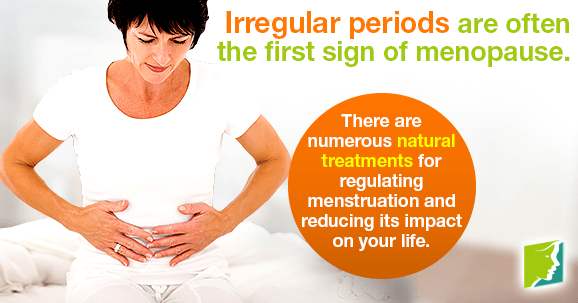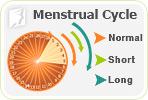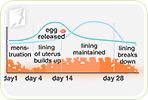Most women experience the frustration of irregular periods at some point during their lives. As a general rule, a woman's menstrual cycle takes place over 28 days, around five of which are comprised of a period. Any menstrual activity that occurs outside this pattern is generally considered irregular. Irregular periods are commonly associated with menopause, but because the menstrual cycle is closely linked with many aspects of your emotional and physical state, it can be difficult to identify menopausal irregular periods as opposed to those related to other conditions.
Consider Age
If you are in your 40s, your irregular periods are likely to be among other, the first sign of menopause. These years are often referred to as perimenopause. During perimenopause, the body prepares to stop menstruation altogether by gradually reducing production of the hormones estrogen and progesterone, which drive the menstrual cycle. Periods can become irregular because of this, with several months often passing between bleeding.
Are Your Periods Heavier?
During perimenopause, periods occurring less frequently creates a buildup in density of the uterus wall lining. This means that, when it is eventually shed, bleeding is likely to be heavier and may involve clotting. If you notice heavier bleeding, clotting, and cramps in the lower back and abdomen, this is an indicator that your irregular periods could symptomize menopause.
Consider Other Symptoms
The other symptoms you experience alongside irregular periods are one of the most telling indicators of whether or not they are associated with menopause.
The menstrual cycle is closely linked with your physical and emotional condition. Factors such as extreme weight change, emotional stress, thyroid malfunctions, reproductive disorders, pregnancy, and breastfeeding can all cause periods to occur irregularly or stop altogether. Scrutinize your lifestyle and look out for concerning symptoms; if you notice anything worrying, consult with your doctor to rule out serious health concerns.
The hormonal imbalance that cause irregular periods during perimenopause can also trigger a range of other symptoms, the most common being hot flashes, night sweats, vaginal dryness, mood swings, and loss of libido. Bear in mind that irregular periods are often the first sign of menopause, so if you have not noticed any of these other symptoms, this does not rule out the possibility that your menstrual irregularities are associated with menopause.
Keep a Record
If you suspect your irregular periods may be a sign of menopause, keeping a record of the dates, duration, and heaviness of your periods and noting down other menopause symptoms when they occur is a good idea. That way, you have a written record that will help you track the process and will be useful should you ever need to consult a doctor about any of your menopause symptoms.
Should I Be Worried?
No. The majority of women experience irregular periods during perimenopause; think of them as an outward indicator that your body is approaching menopause healthily and normally. Remember, you don't have to cope with the process alone; talking to other women, your doctor, or your partner can help.
Although irregular periods during menopause are frustrating and difficult to predict, this is not to say that you cannot manage them; there are numerous natural treatments for regulating menstruation and reducing its impact on your life. It can be difficult to accept this early indicator that you are nearing the end of your reproductive life, but try to remain positive, practical, and embrace the changes that are going on in your body in this new stage of your life.
Sources
- National Health Service. (2013). Periods, irregular - Causes. Retrieved February 25, 2014, from http://www.nhs.uk/Conditions/Periods-irregular/Pages/Causes.aspx
- National Health Service. (2013). Periods, Irregular - Treatment. Retrieved February 25, 2014 from http://www.nhs.uk/Conditions/Periods-irregular/Pages/Treatment.aspx
- National Institutes of Health. (2014). Menstruation. Retrieved February 25, 2014, from http://www.nlm.nih.gov/medlineplus/menstruation.html
- National Institutes of Health. (2011) Vaginal Bleeding. Retrieved February 25, 2014 from http://www.nlm.nih.gov/medlineplus/ency/article/007496.htm
- Better Health. (2013). Menstruation: Abnormal Bleeding. Retrieved February 25, 2014, from http://www.betterhealth.vic.gov.au/bhcv2/bhcarticles.nsf/pages/Menstruation_abnormal_bleeding




